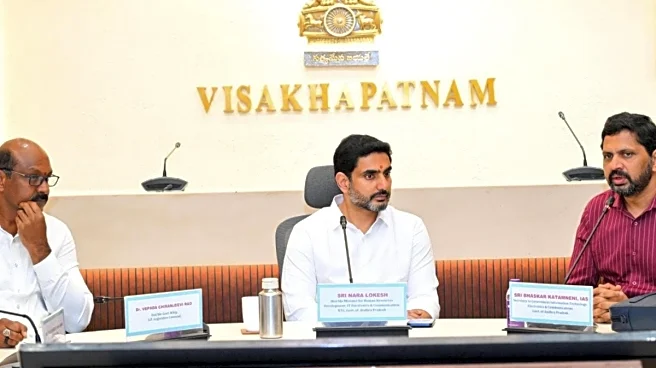Andhra Pradesh Minister for Information Technology and HRD Nara Lokesh emphasised the need to align infrastructure capacity with the surge of investments flowing into the Visakhapatnam region, while planning
for a 30-year development horizon. During his visit to Visakhapatnam on Sunday, where he launched a series of investments and infrastructure initiatives, Lokesh reviewed the city’s readiness and directed officials from North Andhra to prepare a time-bound, future-ready infrastructure blueprint for the region. “Massive investments are coming into the Vizag region. Prepare focused infrastructure plans and execute them in mission mode — without causing inconvenience to the public,” Lokesh instructed, while chairing a high-level review meeting with district collectors, senior officials, and public representatives at the Visakhapatnam Collectorate. Highlighting the importance of forward-looking urban mobility, Lokesh made it clear that Visakhapatnam must avoid the pitfalls of other major metros.
“Vizag should not suffer the traffic chaos of Bengaluru or Pune. Plan wide arterial roads and high-capacity corridors now,” he said, directing officials to prioritize traffic decongestion, corridor-based development, and junction upgrades.
The Minister called for integrated, long-term master plans that anticipate demographic expansion, industrial growth, and logistics needs across Visakhapatnam, Anakapalli, Vizianagaram, and Srikakulam.
“Think 30 years ahead. Prepare comprehensive plans and ensure seamless coordination between officials and elected representatives to deliver visible outcomes,” he added.
Underscoring the government’s jobs-first agenda, Lokesh reaffirmed the target of generating five lakh employment opportunities through upcoming industrial projects — including a major steel plant and several large-scale investments setting up operations in the region.
“This is a once-in-a-generation growth opportunity. Convert it into jobs and inclusive development,” he said.
To accelerate technology-driven growth, Lokesh directed officials to identify and prepare land banks for IT parks across the region.
“Develop shovel-ready sites so investors can plug in and start building without delay,” he advised.
He also stressed the importance of citizen convenience and transparent governance.
“Decisions must be swift, transparent, and people-friendly. Progress should happen without causing inconvenience,” Lokesh said, calling for synchronized execution and regular progress reviews.
The meeting reviewed regional development, industrial inflows, infrastructure readiness, and urban mobility projects. Officials were instructed to finalize corridor designs, draw up phased road-widening plans, and secure land parcels for key public infrastructure.




/images/ppid_59c68470-image-177088261751149179.webp)

/images/ppid_59c68470-image-177088252673355494.webp)
/images/ppid_59c68470-image-17708825857201631.webp)
/images/ppid_59c68470-image-177088255620941443.webp)
/images/ppid_59c68470-image-177088253353351703.webp)
/images/ppid_59c68470-image-177088255557086348.webp)
/images/ppid_59c68470-image-177088252377790833.webp)


